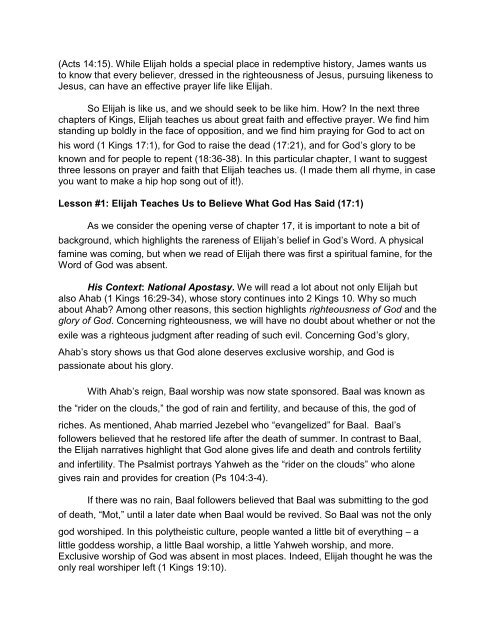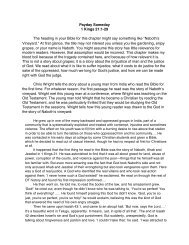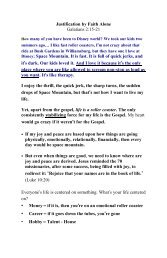Download the sermon notes
Download the sermon notes
Download the sermon notes
You also want an ePaper? Increase the reach of your titles
YUMPU automatically turns print PDFs into web optimized ePapers that Google loves.
(Acts 14:15). While Elijah holds a special place in redemptive history, James wants us<br />
to know that every believer, dressed in <strong>the</strong> righteousness of Jesus, pursuing likeness to<br />
Jesus, can have an effective prayer life like Elijah.<br />
So Elijah is like us, and we should seek to be like him. How? In <strong>the</strong> next three<br />
chapters of Kings, Elijah teaches us about great faith and effective prayer. We find him<br />
standing up boldly in <strong>the</strong> face of opposition, and we find him praying for God to act on<br />
his word (1 Kings 17:1), for God to raise <strong>the</strong> dead (17:21), and for God’s glory to be<br />
known and for people to repent (18:36-38). In this particular chapter, I want to suggest<br />
three lessons on prayer and faith that Elijah teaches us. (I made <strong>the</strong>m all rhyme, in case<br />
you want to make a hip hop song out of it!).<br />
Lesson #1: Elijah Teaches Us to Believe What God Has Said (17:1)<br />
As we consider <strong>the</strong> opening verse of chapter 17, it is important to note a bit of<br />
background, which highlights <strong>the</strong> rareness of Elijah’s belief in God’s Word. A physical<br />
famine was coming, but when we read of Elijah <strong>the</strong>re was first a spiritual famine, for <strong>the</strong><br />
Word of God was absent.<br />
His Context: National Apostasy. We will read a lot about not only Elijah but<br />
also Ahab (1 Kings 16:29-34), whose story continues into 2 Kings 10. Why so much<br />
about Ahab? Among o<strong>the</strong>r reasons, this section highlights righteousness of God and <strong>the</strong><br />
glory of God. Concerning righteousness, we will have no doubt about whe<strong>the</strong>r or not <strong>the</strong><br />
exile was a righteous judgment after reading of such evil. Concerning God’s glory,<br />
Ahab’s story shows us that God alone deserves exclusive worship, and God is<br />
passionate about his glory.<br />
With Ahab’s reign, Baal worship was now state sponsored. Baal was known as<br />
<strong>the</strong> “rider on <strong>the</strong> clouds,” <strong>the</strong> god of rain and fertility, and because of this, <strong>the</strong> god of<br />
riches. As mentioned, Ahab married Jezebel who “evangelized” for Baal. Baal’s<br />
followers believed that he restored life after <strong>the</strong> death of summer. In contrast to Baal,<br />
<strong>the</strong> Elijah narratives highlight that God alone gives life and death and controls fertility<br />
and infertility. The Psalmist portrays Yahweh as <strong>the</strong> “rider on <strong>the</strong> clouds” who alone<br />
gives rain and provides for creation (Ps 104:3-4).<br />
If <strong>the</strong>re was no rain, Baal followers believed that Baal was submitting to <strong>the</strong> god<br />
of death, “Mot,” until a later date when Baal would be revived. So Baal was not <strong>the</strong> only<br />
god worshiped. In this poly<strong>the</strong>istic culture, people wanted a little bit of everything – a<br />
little goddess worship, a little Baal worship, a little Yahweh worship, and more.<br />
Exclusive worship of God was absent in most places. Indeed, Elijah thought he was <strong>the</strong><br />
only real worshiper left (1 Kings 19:10).







